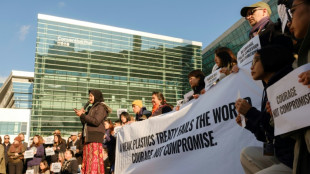
-
 What do we know about Syrian rebels' major offensive on Aleppo?
What do we know about Syrian rebels' major offensive on Aleppo?
-
South Africa beat Sri Lanka by 233 runs in first Test

-
 Incumbent centre-right in 'driving seat' in Irish vote
Incumbent centre-right in 'driving seat' in Irish vote
-
Georgia arrests 107 more people as pro-EU protests continue

-
 Taiwan's Lai departs for US stopover during Pacific trip
Taiwan's Lai departs for US stopover during Pacific trip
-
Kosovo raises security after blast, Serbia denies involvement

-
 More than 122,000 people evacuated in Malaysia due to floods
More than 122,000 people evacuated in Malaysia due to floods
-
Vietnam to build $67 bn high-speed railway

-
 Nations warn of deadlock at landmark plastic pollution talks
Nations warn of deadlock at landmark plastic pollution talks
-
Taiwan's Lai departs on Pacific island tour

-
 Syria war monitor says rebels control 'most of' Aleppo city
Syria war monitor says rebels control 'most of' Aleppo city
-
Greenpeace activists board tanker in plastic protest

-
 Floods displace 122,000 people in Malaysia
Floods displace 122,000 people in Malaysia
-
Taiwan's Lai set to depart on Pacific island tour

-
 American Johnston reels in Herbert at Australian Open
American Johnston reels in Herbert at Australian Open
-
Hawks top Cavs again to advance in NBA Cup, Boston beat Bulls

-
 South Korea star Jung Woo-sung apologises after baby scandal
South Korea star Jung Woo-sung apologises after baby scandal
-
Romania's economic troubles fuel far-right rise

-
 England on verge of wrapping up first New Zealand Test
England on verge of wrapping up first New Zealand Test
-
Icelanders head to the polls after government collapse

-
 England strike twice to have New Zealand in trouble in first Test
England strike twice to have New Zealand in trouble in first Test
-
Researchers analyse DNA from dung to save Laos elephants

-
 North Korea's Kim, Russian minister agree to boost military ties
North Korea's Kim, Russian minister agree to boost military ties
-
Brook's 171 gives England commanding 151-run lead over New Zealand

-
 Kamala's coda: What's next for defeated US VP Harris?
Kamala's coda: What's next for defeated US VP Harris?
-
Chiefs hold off Raiders to clinch NFL playoff berth

-
 Australia's Hazlewood out of 2nd India Test
Australia's Hazlewood out of 2nd India Test
-
Trudeau in Florida to meet Trump as tariff threats loom

-
 Jihadists, allies breach Syria's second city in lightning assault
Jihadists, allies breach Syria's second city in lightning assault
-
Trudeau in Florida to meet Trump as tariff threats loom: media

-
 Hunter shines as Hawks top Cavs again
Hunter shines as Hawks top Cavs again
-
Southampton denied shock Brighton win by dubious VAR call

-
 Alarm over high rate of HIV infections among young women, girls
Alarm over high rate of HIV infections among young women, girls
-
Swiss unveil Euro 2025 mascot Maddli

-
 Bears fire coach Eberflus after latest agonizing NFL defeat
Bears fire coach Eberflus after latest agonizing NFL defeat
-
Rallies mark one month since Spain's catastrophic floods

-
 Arnault family's Paris FC takeover completed
Arnault family's Paris FC takeover completed
-
Georgian police stage new crackdown on pro-EU protestors

-
 'We're messing up:' Uruguay icon Mujica on strongman rule in Latin America
'We're messing up:' Uruguay icon Mujica on strongman rule in Latin America
-
Liverpool dealt Konate injury blow

-
 Van Nistelrooy appointed Leicester manager
Van Nistelrooy appointed Leicester manager
-
Verstappen brought back to earth in Doha after F1 title party

-
 Global wine output to hit lowest level since 1961
Global wine output to hit lowest level since 1961
-
Norris boosts McLaren title hopes with sprint pole

-
 Big-hitting Stubbs takes satisfaction from grinding out Test century
Big-hitting Stubbs takes satisfaction from grinding out Test century
-
Romania recounts presidential ballots as parliamentary vote looms

-
 French skipper Dalin leads as Vendee Globe passes Cape of Good Hope
French skipper Dalin leads as Vendee Globe passes Cape of Good Hope
-
Chelsea not in Premier League title race, says Maresca

-
 Brazil's Bolsonaro aims to ride Trump wave back to office: WSJ
Brazil's Bolsonaro aims to ride Trump wave back to office: WSJ
-
France requests transfer of death row convict held in Indonesia: minister


Tropical storm slams into Philippines, at least 45 dead
Severe Tropical Storm Nalgae slammed into the Philippines on Saturday, after unleashing flash floods and landslides that left at least 45 people dead according to a sharply revised official tally.
Nalgae pounded the archipelago nation's main island of Luzon with maximum winds of 95 kilometres (59 miles) an hour after making landfall on the sparsely populated Catanduanes island before dawn.
The destruction began well ahead of landfall, with heavy rain inundating mostly rural areas on Mindanao island in the south on Thursday followed by deadly landslides and flooding on Friday.
But the government revised its official death toll downward from 72 to 45 in the afternoon.
Officials said some deaths had been erroneously tallied twice from the Mindanao events, which accounted for 40 deaths. The storm also killed five others elsewhere in the country.
In recent years, flash floods with mud and debris from largely deforested mountainsides have been among the deadliest hazards posed by typhoons in the Philippines.
Rescue workers are focusing on the village of Kusiong, home to between 80 and 100 people, which was buried after part of a denuded mountain nearby collapsed.
"Yesterday we were focused on rescue and recovered 11 bodies," regional civil defence chief Naguib Sinarimbo told AFP.
"Today we resumed our work, but this is already a retrieval operation because the village has been buried under rock and mud for more than a day," he added, declining to say how many are feared dead.
The storm also caused flooding elsewhere in the country.
Photos released by the coastguard showed rescuers using an old refrigerator as an improvised boat to pull children from a flooded community on the central island of Leyte.
The state weather service said the eye of Nalgae passed the small island of Marinduque in mid-morning and could hit Manila, a sprawling metropolis of more than 13 million people, later Saturday.
"Widespread flooding and rain-induced landslides are expected," while there was "minimal to moderate risk of storm surge" or huge waves hitting coastal areas, it added.
"Based on our projections, this one is really strong, so we really prepared for it," national civil defence director Rafaelito Alejandro said, adding that 5,000 rescue teams were on standby.
He urged residents in the storm's path to stay at home before the storm exits into the South China Sea early Sunday.
"If it's not necessary or important, we should avoid going out today because it is dangerous and could bring you harm," Alejandro said.
More than 7,000 people were evacuated ahead of the storm's landfall, the civil defence office said.
The coast guard has also suspended ferry services through most of the archipelago nation due to rough seas, stranding hundreds of vessels and thousands of passengers at ports.
The civil aviation office, meanwhile, said it has shelved more than 100 flights so far.
The storm struck at the beginning of a long weekend in the Philippines, when millions return to their hometowns to visit the graves of their dead relatives.
The Philippines is hit by an average of 20 major storms each year that kill hundreds of people and keep vast regions in perpetual poverty.
Scientists have warned that such storms, which also kill livestock and destroy key infrastructure, are becoming more powerful as the world gets warmer because of climate change.
J.Bergmann--BTB
